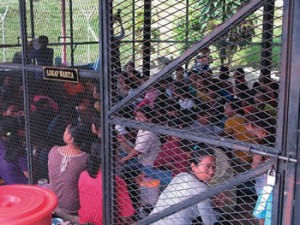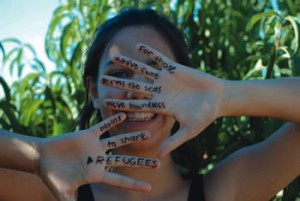The Refugee’s Tale
In offering this work to God I ask you who are about to read it to pray for those who are forced to leave their homelands. Those who this minute, carrying crosses heavy with the sins of the world are fleeing from their countries, stripped of themselves and trapped in camps, or are suffering still despite being in places of safety.
This is Dennis’s story
Dennis was born in Myanmar. An articulate, confident student, he edited a Catholic magazine, and led a youth group. Life was fun, he was 21, and nothing was more amusing than to go carol singing night after night and use the opportunity (having seen the girls home) to break curfews and pick fights with off duty army personnel from one of the six battalions parked up around town. Groups under Dennis’s direction formed bigger clusters, the better to defy the military.
Harassing the army in a country under a military junta’s rule is dangerous, and those who rule in Myanmar are well known and internationally condemned for their human rights’ abuses. ‘Fortunately I wasn’t politically active at university. Some of my friends started disappearing. One guy I know was questioned and then never went home – he went to the Indian border and joined an insurgent group’, Dennis says. He nonetheless still confidently believed he could provoke the military without reprisal: then suddenly found himself running for his life.
Arriving in Malaysia, Dennis found it hard to comprehend he was a refugee. ‘My father spoke of political leaders that sought asylum … but these were like fairy tales’, he says.
No fairy tale this. Living in a foreign country without papers is never a good plan. As he had no money, Dennis had to ring his family and ask for some. The trouble was, they had no phone, so complicated arrangements involving intermediaries and appointments for his parents to be at hand for a phone call had to be made. Not knowing the United Nations could help him, Dennis lived a half-life, moving from job to job. He spoke no Chinese or Malay, and had minimal English. He was in constant fear of being stopped by – or reported to – the police. After three months, he was arrested and joined thousands of others at a deportation camp.
Women and children were held in one block, men in another. There were overstayers and illegal immigrants from Myanmar, Indonesia, Nepal, Bangladesh, some African countries and Britain. If you don’t have good connections, you can disappear without anyone realising. Compatriots look after each other. Arguments are broken up by police with long batons.
When you’re admitted to the camp, they take all your possessions – money, cellphones, shoes. Then you’re publicly stripped to be searched. Your identification number becomes your name. If you’re like Dennis, you hope you’ll be a ‘normal’ person again someday.
Two months later, Dennis was deported to Thailand. Some people are handed directly to the authorities. Others are taken to the border river, dropped off and have to try to get away. They can’t. ‘Sometimes people with bikes grab you. They might sell you to a fishing boat owner or to a human trafficker’ Dennis says. What happens to young women is ‘unthinkable’ and few men survive the fishing boats. You can also get picked up by an agent – the kind who keeps you safe for their own ends. When the time’s right they make you ring your friends and ask for money. You have to give it to the agents, who take their cut before returning you to Malaysia.
Dennis was handed directly to the Thai authorities. He was kept in a lock-up at the border without any explanation or common language to ask for one. ‘It was a nightmare, much worse than the camp. There wasn’t enough space to lie down and I was mentally weakened’, Dennis says. He has since heard from another inmate that he kept slipping into a fantasy world where he was conversing with a friend in Germany.
A week later he was sent to a prison near the Myanmar border. Everyone was scared because sometimes captives are handed to the Myanmar authorities. To get out you have to pay – but Dennis had no money. Eventually an agent came, paid for him to leave the prison, took him to the Malay border, and told him to ring his friends and ask for money. None could help, so he had to work for the agent for his keep and pocket money. Three and a half months later the agent sent Dennis to Malaysia, where he sought help from the United Nations.
To survive, Dennis lived his half-life again, working in cafes and food courts. He had a day or two off a month, was always afraid, forever on the move. He was arrested often, but now knew to pay off the police. His last shreds of self-esteem evaporated. Despite this, he kept hoping he’d eventually have a better life. Three years and seven interviews later the United Nations granted him refugee status.
In 2008 he was sent to New Zealand. Although safe, his memories aren’t the sort that can be sloughed off at will: rebuilding his life and reconstructing his confidence will take time. He is studying for a degree in social work with the help of an NGO social work study award. In his Caseworker role at Red Cross Refugee Services, he helps resettle some of the 750 political refugees who come here each year. His work ‘can be good, but also painful – sometimes situations trigger my weakness’.
In 2011, one of Dennis’s brothers joined him in Wellington, which has helped significantly. He has just become a citizen, and hopes to visit his homeland soon. His future looks promising. His brother needs a job so he can have a fair start. Can someone help with this?
Dennis’s urgent plea is for our priests and leaders to spend time with the Catholic refugees in our Parishes and for us to welcome and connect them to our church communities.
Dennis’s story has a happy ending. Not all do. Please pray for refugees and those who suffer from the sins of the world.
Amen .

 Entries(RSS)
Entries(RSS)